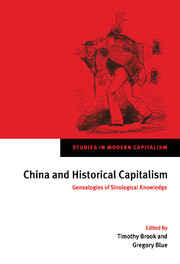Book contents
- Frontmatter
- Contents
- Preface
- Major dynastic periods in China's history
- 1 Introduction
- 2 The West, capitalism, and the modern world-system
- 3 China and Western social thought in the modern period
- 4 Capitalism and the writing of modern history in China
- 5 Towards a critical history of non-Western technology
- 6 The political economy of agrarian empire and its modern legacy
- Bibliography
- Index
3 - China and Western social thought in the modern period
Published online by Cambridge University Press: 22 September 2009
- Frontmatter
- Contents
- Preface
- Major dynastic periods in China's history
- 1 Introduction
- 2 The West, capitalism, and the modern world-system
- 3 China and Western social thought in the modern period
- 4 Capitalism and the writing of modern history in China
- 5 Towards a critical history of non-Western technology
- 6 The political economy of agrarian empire and its modern legacy
- Bibliography
- Index
Summary
Western interpretations of the nature and significance of Chinese civilization have varied widely over the past eight centuries. At times quite opposing readings have been made of China even within a single period. This diversity of opinions has been documented in a number of detailed surveys on the history of Western ideas about China, and it is not the aim here to elucidate it in detail. In the present chapter, attention will be devoted rather to situating the development of certain key ideas about China in terms of trends in the evolution of Western social thought, especially notions related to what was often termed “the nature” of Chinese society, a concern that underlay and shaped Western discourses about China from the sixteenth till the mid-twentieth century when the bourgeoisies of the leading Western states asserted themselves and then consolidated power in classical fashion both at home and globally. The different phases in the development of ideas about China were linked to broader trends in ideology, political goals, and capitalist economic priorities, though not always in obvious or predictable ways. For present purposes we will not examine the large bodies of literature written by or devoted to authors who over the centuries traveled to China and wrote accounts of it; nor will we consider the corpus of expert works by scholars who devoted themselves primarily to Chinese studies.
- Type
- Chapter
- Information
- China and Historical CapitalismGenealogies of Sinological Knowledge, pp. 57 - 109Publisher: Cambridge University PressPrint publication year: 1999
- 21
- Cited by

